A Pending Assignment

The latest Corruption Perceptions Index (CPI) report published by Transparency International ranks Mexico 135 out of 180 countries, and 27 out of 32 in the Americas.
While economic indicators show a stable, even positive, picture, other indicators hinder any optimism.
Two international measurements, one of corruption perception and another on the rule of law, demonstrate the structural weakness we have been dragging for decades and that prevents us from achieving sustained development.
The latest Corruption Perceptions Index (CPI) report published by Transparency International (www.transparency.org) ranks us 135 out of 180 countries, and 27 out of 32 in the Americas. Although poor performance is widespread (two-thirds of the countries obtained an average of 43/100 points), Mexico’s ranking continues to fall year after year. Despite having approved a national anti-corruption system (SNA), we scored only 29 points.
The key lies in establishing laws and institutions that promote greater transparency and accountability in the public sector as a first step, but progress is made when detected acts of corruption are sanctioned, as has been done in Brazil, Ecuador, and Peru.
The Rule of Law Index 2017, created by the World Justice Project, presents a similar picture (www.worldjusticeproject.org). Mexico ranks 92 out of 113 countries (and 25 out of 30 at the regional level), above Turkey, Afghanistan, or Venezuela, but far from Argentina (46), Colombia (72), or the Philippines (88), and light years away from our commercial partners, the United States (19) and Canada (9). We clearly fail in violence, insecurity, and in civil and criminal justice.
It seems that we have learned important lessons about economic fundamentals from past crises, but are still unable to learn and correct our serious legality and institutionalism deficit.
In this regard, the closing of the anti-corruption chapter in the last renegotiation session of the North American Free Trade Agreement (NAFTA) with the United States and Canada is a light at the end of the tunnel. Although little publicized, the signing of commitments regarding government and companies’ best practices and integrity in the three countries can correctly align the incentives and eliminate opacity, as well as political use of justice and impunity.
When we think about the source of society’s bad temper, the biggest problem perceived by the people, or the issues that will define the 2018 election, corruption occupies the first positions. This means we have a pending assignment that goes beyond political ideologies or partisan colors. And that economic performance is a necessary variable but is not enough for the development of the country and, ultimately, to win the votes of the citizens.
The peephole. In a meeting with El Heraldo de México, the PRI presidential candidate José Antonio Meade insisted that campaigns do count and have not started yet. He is right.
The views expressed here are solely those of the author.
This post was originally published in Spanish on El Heraldo de Mexico.
About the Author


Mexico Institute
The Mexico Institute seeks to improve understanding, communication, and cooperation between Mexico and the United States by promoting original research, encouraging public discussion, and proposing policy options for enhancing the bilateral relationship. A binational Advisory Board, chaired by Luis Téllez and Earl Anthony Wayne, oversees the work of the Mexico Institute. Read more










